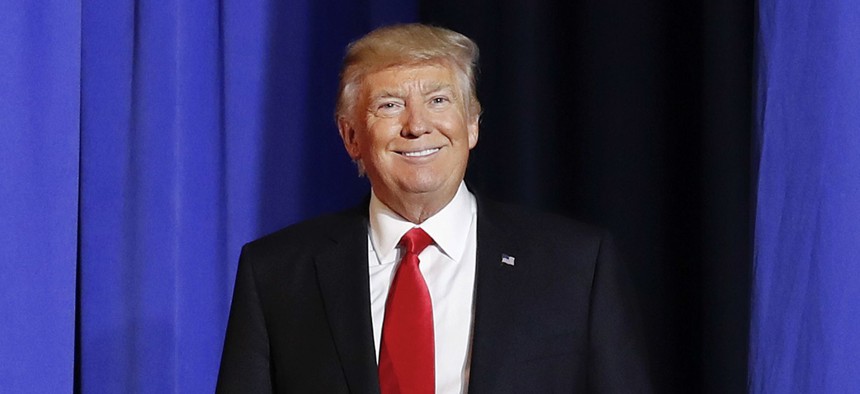Governors to Trump: ‘We Are Ready to Work With You’

President Donald Trump smiles as he introduced before speaking at the Homeland Security Department in Washington, Wednesday, Jan. 25, 2017. Pablo Martinez Monsivais / AP Photo
Govs. Terry McAuliffe of Virginia and Brian Sandoval of Nevada delivered the National Governors Association’s State of the States Address, outlining intergovernmental policy priorities.
WASHINGTON — Governors are eager to provide input as President Trump and the Republican Congress begin to pursue an ambitious policy agenda that could have serious ramifications for states, Govs. Terry McAuliffe of Virginia and Brian Sandoval of Nevada emphasized on Wednesday.
“We have a simple message for President Trump and the leaders of the Congress,” said McAuliffe. “We are here. We are ready to work with you.”
McAuliffe, a Democrat, and Sandoval, a Republican, spoke during the National Governors Association’s 2017 State of the States Address in the nation’s capital. Their remarks focused heavily on priorities Trump has identified: infrastructure, health care and tax reform.
Sandoval urged the new administration to ensure that there is a stable, long-term federal funding stream to help pay for infrastructure projects. The Highway Trust Fund, a main pot of money for road and transit projects, has been weakened by declines in fuel tax revenue.
“That instability causes states to think twice before pursuing large scale, multi-year projects,” Sandoval said as he discussed the financial difficulties plaguing the trust fund.
The Nevada governor stressed that infrastructure extends beyond transportation to areas like water and wastewater systems, the electricity grid and broadband networks.
Trump has proposed making billions of dollars of infrastructure upgrades across the U.S. His plans call for federal tax credits and a significant amount of private sector investment. A list assembled by his team of about 50 possible projects worth $137 billion surfaced Tuesday.
Senate Democrats, meanwhile, have released their own $1 trillion infrastructure proposal.
With health care, Trump and congressional Republicans have pledged to repeal the Affordable Care Act, also known as Obamacare.
“Repealing the Affordable Care Act, without offering an adequate replacement, will have far reaching consequences for our states,” McAuliffe warned.
He said eliminating the health care law and shifting Medicaid to a block grant system endorsed by some Republican governors could cost Virginia over $300 million in its next budget cycle.
Kellyanne Conway, a Trump adviser, said during a television interview broadcast on NBC last weekend that the president backs the block grant system.
Medicaid offers health care coverage to lower income Americans. As it stands, the level of federal funding that flows to states for the program is open-ended and fluctuates with costs for care and enrollment. A block grant approach could mean it becomes a fixed amount.
Virginia is one of 19 states that has not expanded the income eligibility threshold for Medicaid under the Affordable Care Act.
Nevada is a Medicaid expansion state. Sandoval said he wanted to see more details about what the block grants might look like. He indicated that it would be important to have a mechanism that lets the size of grants vary based on economic conditions.
When the economy slumps, more people typically end up covered by Medicaid. If federal block grants are a fixed amount, and participation in the program were to unexpectedly swell, it could create a situation where states end up getting stuck with sizable costs.
On tax reform, top concerns for governors include protecting the income tax exemption for municipal bonds and enabling states to capture sales taxes from online purchases.
Municipal bonds are commonly used by state and local governments when they finance infrastructure. The tax exempt status for interest investors earn from the bonds is generally believed to keep borrowing expenses lower for states and localities.
But the exemption costs the federal government money in foregone tax revenue and some critics say that it’s an inefficient way to subsidize infrastructure spending. There are fears among supporters of the exemption that it could get axed as part of a broader tax reform package.
Immigration also came up as McAuliffe and Sandoval made their comments and answered questions from reporters at the National Governors Association event. Trump took executive action Wednesday to advance his plans for a wall on the nation’s border with Mexico.
Asked about the wall, Sandoval said: “In my list of things to get done, that wouldn’t be one of them.”
McAuliffe, who is the current chair of the National Governors Association, and Sandoval, who is vice chair, both said they wanted to see Trump succeed during his term as president.
“I’m absolutely optimistic about the opportunity to work with him and his administration,” said Sandoval. He added: “It’s a new era in Washington.”
Bill Lucia is a Senior Reporter for Government Executive’s Route Fifty and is based in Washington, D.C.
NEXT STORY: San Francisco takes on local flooding with Adopt a Drain






